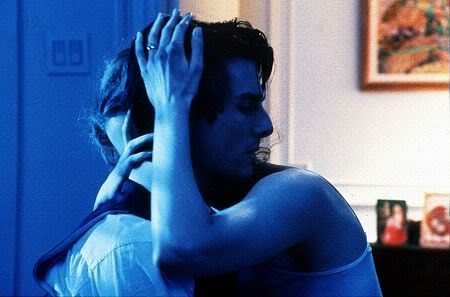Looking at the movies of 1999 and searching for some kind of end-of-the-millenium sort of theme, a summing-up that would round off the fabulous century…I got no such thing. However. You could do worse than to finish off a millenium with Stanley Kubrick’s final film, which has many and various dreamy observations on the subject of looking, the land mines of the imagination, the expectations of storytelling, and a certain unresolved undercurrent that could be described as the hilarity of anxiety.
Eyes Wide Shut even has a near-century’s reach; Arthur Schnitzler’s Traumnovelle, the basis for the movie, was published in 1926, before the world did a lot of bad, bad things. This led to a certain amount of chortling among critics who felt the movie’s ideas on sexual jealousy were out of date (and hey, New York City doesn’t really look like that, therefore this film sucks), which is the kind of criticism that shows how out of touch the critic is, not the other way around.
Cruise/Kidman tripped up some people too; we’re not supposed to applaud those people, right? But they are very good at what they are, here. To quote from a review I wrote two hours after seeing the movie, Kubrick’s style with actors is sometimes derided as inhuman, but his methods capture a precise sense of the anxious, the banal, the fatuous. Cruise’s performance in the early reels is a superb look at bourgeois self-satisfaction, unction at its extreme; his civilized adieu to the poor nude junkie who has almost died at the party – “Goodnight, Mandy” – is supremely clueless.
Eyes Wide Shut is an enchantment. It draws you in and slows you down, and something about it remains mystifying. As for the year’s other films, I find as much to admire in some of the smaller, stranger works than in the big guns. So with some difficulty, the best movies of 1999:
1. Eyes Wide Shut (Stanley Kubrick)
2. Ride with the Devil (Ang Lee)
3. Rosetta (Jean-Pierre and Luc Dardenne)
4. Being John Malkovich (Spike Jonze)
5. The Little Girl Who Sold the Sun (Djibril Diop Mambéty)
6. Three Kings (David O. Russell)
7. The Straight Story (David Lynch)
8. Election (Alexander Payne)
9. The Insider (Michael Mann)
10. Kadosh (Amos Gitai)
Mambéty’s film is under feature length, but terrific in every way (it was his last film, too). Someday I will see The Sixth Sense again to find out if it deserves more from me, but I actually like some of Shyamalan’s later stuff better (including Lady in the Water). I like Kevin Smith’s Dogma, Neil Jordan’s The End of the Affair, Sam Mendes’ American Beauty, Mike Leigh’s Topsy-Turvy, and most of David Fincher’s Fight Club, but somehow they have slipped where other movies have maintained, so there you go. Abbas Kiarostami’s The Wind Will Carry Us is representative of this filmmaker’s Nineties work, but somehow a retreat, too.
But you could make an alternative group of interesting items that somehow aren’t Ten-worthy but deserve attention. (All right, you could do that every year, but this collection strikes me as especially inventive.) Where do you put Ravenous (Antonia Bird), Dick (Andrew Fleming), The Minus Man (Hampton Fancher), Ghost Dog: The Way of the Samurai (Jim Jarmusch), The Limey (Steven Soderbergh), Pola X (Leos Carax), Holy Smoke (Jane Campion), Ratcatcher (Lynn Ramsay), Wonderland (Michael Winterbottom), and Guinevere (Audrey Wells)? In their own cool paragraph, that’s where.
Yeah, The Matrix (Larry and Andrew Wachowski) came out too. That was sort of fun. And I like Paul Thomas Anderson’s films quite a bit, but Magnolia struck me as the kind of over-reaching a talented young director probably ought to do, even if it fails as seriously as I think that film does. No complaints about Toy Story 2 or South Park: Bigger, Longer, and Uncut, two different cartoon versions of America.
There’s more, but this is long enough. Final one: I am currently re-thinking John Sayles’s Limbo, a very peculiar film that, if it had subtitles and a lower budget (though I’m sure its budget was lower than it looks), would likely have been hailed as a radical examination of narrative, instead of just another talky Sayles picture.
Filed under: Year by Year Best Movies | Tagged: 1999 Ten Best Movies, Eyes Wide Shut, Stanley Kubrick |






Another terrific list . I don’t know THE LITTLE GIRL WHO SOLD THE SUN or KADOSH. My favourite for the year is TOPSY TURVY but I haven’t seen it for a while. And I really like THE DREAM LIFE OF ANGELS.
Count me another one who thinks highly of Topsy-Turvy, one of my favorites from the year. I don’t know another film that is as comprehensive about telling the “backstage story” of theater. Many scenes are brilliant little stories unto themselves.
I, too, was bewildered by the “that’s not what New York looks like” criticisms of Eyes Wide Shut. I would ask if these same critics complain about the unrealistic architecture in The Cabinet of Dr. Caligari, but I doubt any of them have seen it, let alone understand what expressionism is — which is admittedly a snooty kind of word, but not a snooty kind of idea. Eyes Wide Shut is a pseudo-dream movie; everything you see is filtered through the main character’s mind. His environment was designed to reflect his state of mind, not document what a particular city looks like, which would be quite beside the point.
The Sixth Sense is probably my favorite of the year. Three more mentions in the animated category: The Iron Giant is infectious and fun, despite its heavy-handed message; Tarzan is one of the best screen adaptations of this oft-filmed character; Fantasia 2000 turned out not to be especially memorable but it was certainly beautiful.